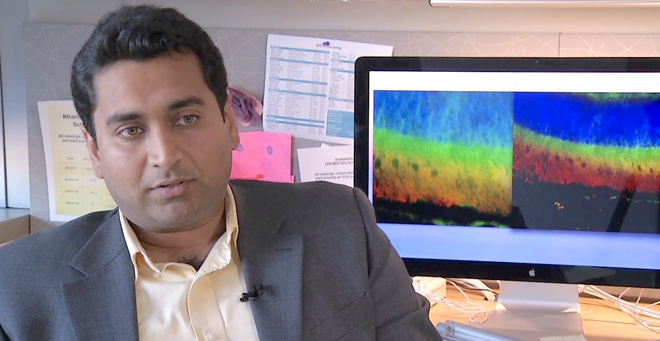 |
|
|
Hemant Khanna, PhD |
New research by Hemant Khanna, PhD, and colleagues in the Horae Gene Therapy Center at UMass Medical School explores a novel gene therapy to treat the most common form of Leber congenital amaurosis. LCA is a severe inherited disorder that causes childhood blindness. Mutations in the CEP290 gene are the most common cause of LCA, responsible for up to 25 percent of cases.
“Our study is the first to use a gene therapy strategy using a shorter version of the human CEP290 gene with clinically safe viral vectors,” said Dr. Khanna, associate professor of ophthalmology. “It shows the potential of using a truncated CEP290 to treat this fast progressing and devastating disease.”
While recent forays into gene therapy approaches for another form of LCA have been encouraging, the large size of CEP290 has been a roadblock to using adeno associated virus (AAV) vectors, which are the conventional means to transport a correct gene into the eye.
Published online by Human Gene Therapy, the study found thatthe use of “minigenes” as a therapeutic strategy is a viable option for delivering large genes, as has already been demonstrated in other diseases, notably Duchenne’s muscular dystrophy.
The Khanna lab previously identified and characterized several CEP290 minigenes that participate in distinct functions of the cilia, which are antenna-like structures present in almost cells, including the eyes’ light-sensing photoreceptors. In the new study, experiments were conducted using these minigenes to identify the ones that could partly or completely compensate for the loss of CEP290. Experiments in cell cultures using epithelial skin cells from mice carrying a CEP290 mutation first identified which minigenes were most promising; scientists then inserted those into the AAV vectors and injected them into the retinas of newborn mice with the CEP290 defect. Photoreceptor survival, structure and function improved significantly, compared to untreated mice.
“Structurally, treated mice had more live cells when viewed microscopically, and we were able to delay the loss of photoreceptor function,” said Khanna, citing the two metrics investigators tracked. Untreated mice went totally blind within 2 to 3 weeks of mouse lifespan; with injection, mice showed better retinal structure and function for up to 8 weeks. “Being able to achieve functional rescue shows that the diseased cells have the capacity to regain function as long as they receive the correct dose of the right gene,” said Khanna. But the recovery was partial and did not last. “What we want to do next is extend the cells’ life span and further improve their function.”
Gene therapy studies are a recent undertaking of the Khanna lab, which investigates the molecular and cellular basis of neurodegenerative diseases of the eye, with special focus on those caused by defective ciliary function in the photoreceptors, which includes LCA and retinitis pigmentosa.
“My focus has always been to understand the mechanisms of the diseases we study, but push to use that information to translate into a treatment came from other scientists here,” said Khanna, who received funding from the UMMS Center for Clinical and Translational Science for the CEP290 studies that formed the foundation of the mini gene therapy approach. This study was also partially funded by the Foundation Fighting Blindness and the National Institutes of Health. “My interest in gene therapy developed because of the great collaborators and amazing scientists here at the Horae Gene Therapy Center.”
Related stories on UMassMedNow:
UMMS experts: New gene therapy success holds promise for degenerative retinal diseases
In search of . . . treatments for retinal diseases: Hemant Khanna, PhD
Grants encourage innovative research
Horae Gene Therapy Center announces collaboration with Spark Therapeutics
Horae Oriental endows Gene Therapy Center at UMass Medical School with $2M gift